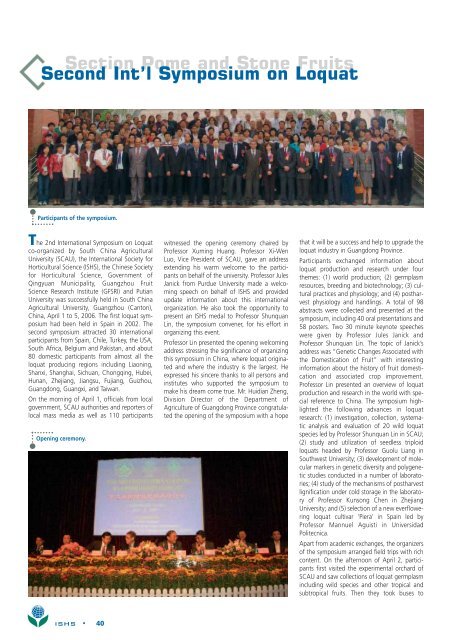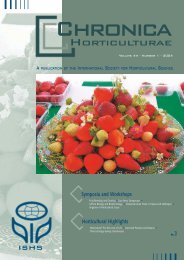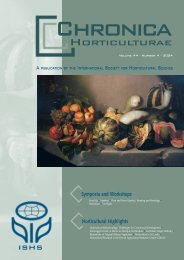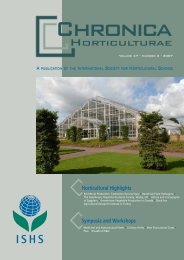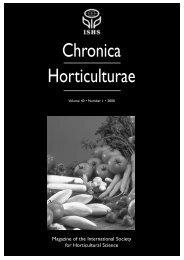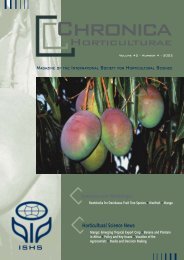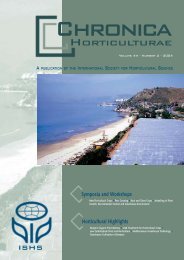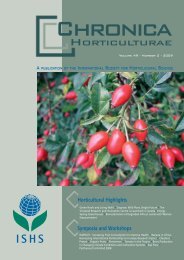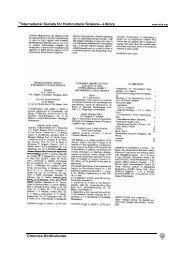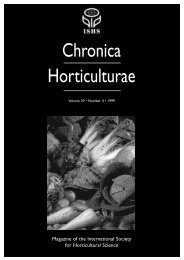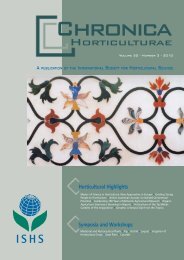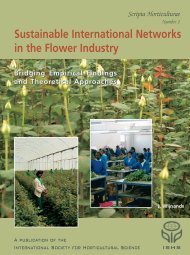Acta Horticulturae
Acta Horticulturae
Acta Horticulturae
Create successful ePaper yourself
Turn your PDF publications into a flip-book with our unique Google optimized e-Paper software.
Section Pome and Stone Fruits<br />
Second Int’l Symposium on Loquat<br />
Participants of the symposium.<br />
The 2nd International Symposium on Loquat<br />
co-organized by South China Agricultural<br />
University (SCAU), the International Society for<br />
Horticultural Science (ISHS), the Chinese Society<br />
for Horticultural Science, Government of<br />
Qingyuan Municipality, Guangzhou Fruit<br />
Science Research Institute (GFSRI) and Putian<br />
University was successfully held in South China<br />
Agricultural University, Guangzhou (Canton),<br />
China, April 1 to 5, 2006. The first loquat symposium<br />
had been held in Spain in 2002. The<br />
second symposium attracted 30 international<br />
participants from Spain, Chile, Turkey, the USA,<br />
South Africa, Belgium and Pakistan, and about<br />
80 domestic participants from almost all the<br />
loquat producing regions including Liaoning,<br />
Shanxi, Shanghai, Sichuan, Chongqing, Hubei,<br />
Hunan, Zhejiang, Jiangsu, Fujiang, Guizhou,<br />
Guangdong, Guangxi, and Taiwan.<br />
On the morning of April 1, officials from local<br />
government, SCAU authorities and reporters of<br />
local mass media as well as 110 participants<br />
Opening ceremony.<br />
witnessed the opening ceremony chaired by<br />
Professor Xuming Huang. Professor Xi-Wen<br />
Luo, Vice President of SCAU, gave an address<br />
extending his warm welcome to the participants<br />
on behalf of the university. Professor Jules<br />
Janick from Purdue University made a welcoming<br />
speech on behalf of ISHS and provided<br />
update information about this international<br />
organization. He also took the opportunity to<br />
present an ISHS medal to Professor Shunquan<br />
Lin, the symposium convener, for his effort in<br />
organizing this event.<br />
Professor Lin presented the opening welcoming<br />
address stressing the significance of organizing<br />
this symposium in China, where loquat originated<br />
and where the industry is the largest. He<br />
expressed his sincere thanks to all persons and<br />
institutes who supported the symposium to<br />
make his dream come true. Mr. Huidian Zheng,<br />
Division Director of the Department of<br />
Agriculture of Guangdong Province congratulated<br />
the opening of the symposium with a hope<br />
that it will be a success and help to upgrade the<br />
loquat industry in Guangdong Province.<br />
Participants exchanged information about<br />
loquat production and research under four<br />
themes: (1) world production; (2) germplasm<br />
resources, breeding and biotechnology; (3) cultural<br />
practices and physiology; and (4) postharvest<br />
physiology and handlings. A total of 98<br />
abstracts were collected and presented at the<br />
symposium, including 40 oral presentations and<br />
58 posters. Two 30 minute keynote speeches<br />
were given by Professor Jules Janick and<br />
Professor Shunquan Lin. The topic of Janick’s<br />
address was “Genetic Changes Associated with<br />
the Domestication of Fruit” with interesting<br />
information about the history of fruit domestication<br />
and associated crop improvement.<br />
Professor Lin presented an overview of loquat<br />
production and research in the world with special<br />
reference to China. The symposium highlighted<br />
the following advances in loquat<br />
research: (1) investigation, collection, systematic<br />
analysis and evaluation of 20 wild loquat<br />
species led by Professor Shunquan Lin in SCAU;<br />
(2) study and utilization of seedless triploid<br />
loquats headed by Professor Guolu Liang in<br />
Southwest University; (3) development of molecular<br />
markers in genetic diversity and polygenetic<br />
studies conducted in a number of laboratories;<br />
(4) study of the mechanisms of postharvest<br />
lignification under cold storage in the laboratory<br />
of Professor Kunsong Chen in Zhejiang<br />
University; and (5) selection of a new everflowering<br />
loquat cultivar ‘Piera’ in Spain led by<br />
Professor Mannuel Aguisti in Universidad<br />
Politecnica.<br />
Apart from academic exchanges, the organizers<br />
of the symposium arranged field trips with rich<br />
content. On the afternoon of April 2, participants<br />
first visited the experimental orchard of<br />
SCAU and saw collections of loquat germplasm<br />
including wild species and other tropical and<br />
subtropical fruits. Then they took buses to<br />
ISHS • 40


